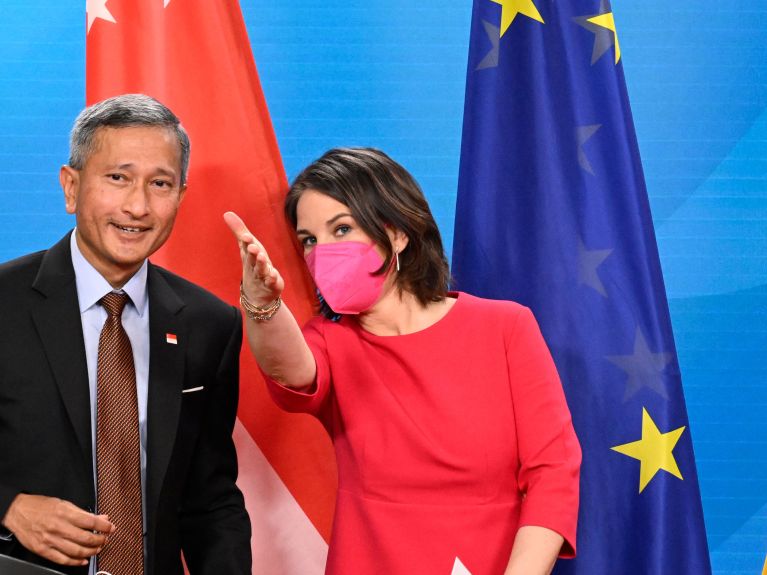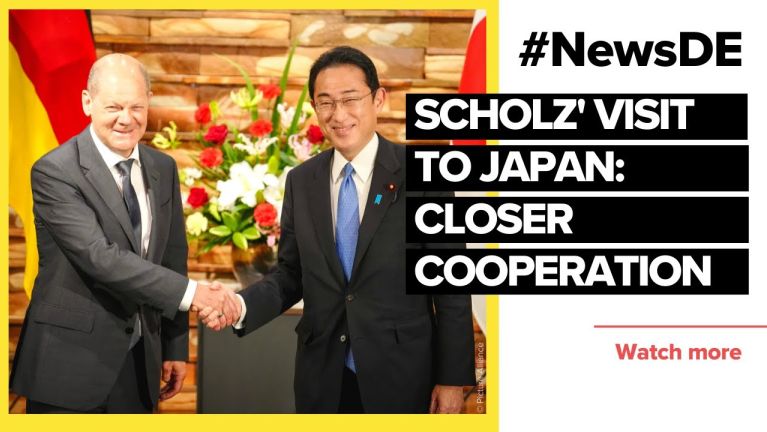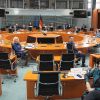Initial results of the Indo-Pacific Initiative
Germany and the EU regard the Indo-Pacific as a strategically important partner region. Asia expert Hanns Günther Hilpert explains how the regions are drawing closer together.

We asked Dr Hanns Günther Hilpert, an Asia expert from the German Institute for International and Security Affairs (SWP) in Berlin, five questions about the Indo-Pacific Initiative.
Dr Hilpert, the German government’s Info-Pacific Guidelines have been in place since 2020, while the European Union has had an Indo-Pacific Strategy since 2021. Before we get started, how would you describe “Indo-Pacific” geographically?
The Indo-Pacific is a geographical and strategic frame of reference that is interpreted in quite different ways in official documents and national security strategies. When it comes to understanding the Indo-Pacific, three elements are important and common to all the various concepts. Firstly, the Indian and Pacific Oceans can be regarded as one cohesive space on account of their significance in terms of global seaborne traffic and the global economy. Secondly, the Indo-Pacific is the setting for the geopolitical rivalry between America and China. And thirdly, the Indo-Pacific is regarded as the regulatory and strategic counterpoint to China’s Belt and Road Initiative.
Dieses YouTube-Video kann in einem neuen Tab abgespielt werden
YouTube öffnenThird party content
We use YouTube to embed content that may collect data about your activity. Please review the details and accept the service to see this content.
Open consent form
© SWP
One goal of the Indo-Pacific Strategy is to “diversify”, i.e. reduce the EU’s dependence on China. What has happened at the political level so far?
The desire to step up political engagement in the region, as officially set out in the German government’s policy guidelines on the Indo-Pacific and in the EU’s Indo-Pacific Strategy, has indeed led to some initial results. It is worth highlighting in this context the upgrading of the EU-ASEAN relationship to a strategic partnership, Germany’s initiation of security policy consultations with Japan and Australia, the highly symbolic training voyage and presence of the frigate Bayern in Asia, the opening of a regional Germany centre by the Federal Foreign Office in Singapore, and the signing of an EU-ASEAN Air Transport Agreement. The EU’s negotiations aimed at achieving a free trade agreement with Australia, New Zealand and Indonesia and updating its agreement with Chile have not yet been concluded, on the other hand.
Game-changing developments and shifts in perspective are inevitable.
Putin’s war of aggression in Ukraine has lent a whole new significance to the initiatives with Asia. Have economic relations also changed already?
As things currently stand – in April 2022 – it is certainly too early to attempt any robust assessment of the consequences that the Ukraine war will have for trade and business in the Indo-Pacific region. Game-changing developments and shifts in perspective are inevitable, however. Firstly, it can already be seen that all the countries in the Indo-Pacific region are being affected in the short term by supply chain outages and increased prices for energy, raw materials and foods, and in the medium term by a weaker economy. Japan, Korea, Taiwan, Singapore, Australia and New Zealand have signed up to the international sanctions against Russia. Furthermore, scepticism about this supplier is likely to have grown for various reasons in the countries of South and Southeast Asia, which are traditionally among the leading importers of Russian weapons. On the other hand, China’s decidedly pro-Russian neutrality has made it very clear to German and European companies that excessive vulnerability vis-à-vis China can pose a threat to their very existence.
The China-Taiwan conflict is simmering in the background. The West’s economic dependence on China would be far higher than its dependence on Russia, if push came to shove …
Correct. China is Germany’s biggest trade partner. Though Germany’s foreign trade is in general broadly diversified, there are considerable dependencies and vulnerabilities in some sectors. For example, China plays a dominant role as a supplier to the global markets of things such as electronic components, basic pharmaceutical ingredients and certain metals like graphite, magnesium and rare earths. Germany’s 30 largest DAX-listed companies generate on average 18 percent of their turnover in China – some significantly more, such as the automotive manufacturers and BASF. Their dependence on the Chinese market is correspondingly large. What is more, technological dependencies exist or are looming, for instance in the areas of rare earth smelters, communication technologies and artificial intelligence. China’s party and state are taking advantage of the economic dependencies of foreign countries to achieve their economic and political objectives.
Would any Chinese aggression towards Taiwan, no matter what form it might take, mean the end of globalisation? There has already been talk of this, the buzzword being “decoupling”.
The national security prerogative already demands a certain decoupling from China. In addition, China itself is striving for increased economic autonomy as part of its dual circulation strategy. Were China to attempt to annex Taiwan by applying economic or political pressure or indeed military force, the USA and its allies in Europe and Asia would probably drastically scale back their economic ties with China. This would not mean the end of globalisation, however. The majority of third states will not be willing to pick just one side between China and America in their foreign economic relations. Above all, the economic benefits of trade and division of labour are generally far too great for any country to rationally consider withdrawing into self-sufficiency or even just regional economic alliances. It is to be expected however that the striving for resilience and security considerations will have an even stronger impact on the international economy.



